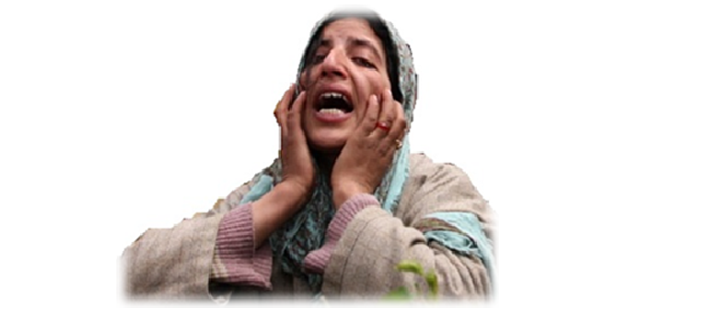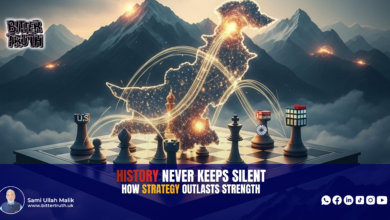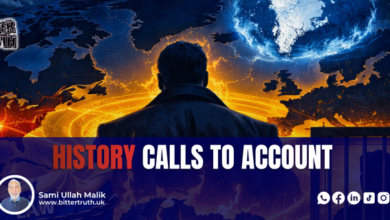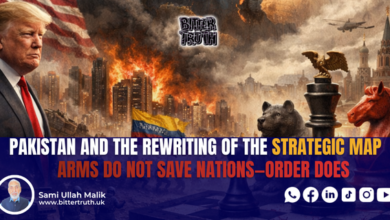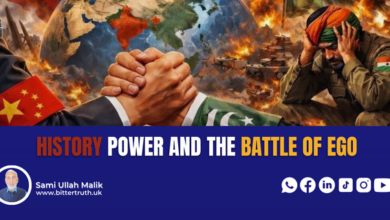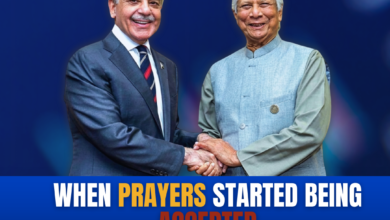The Last Hours of the Night
This Terrestrial Paradise Where the Law of the Jungle Prevails
The ringing of the bell in the last hours of the night disrupted my heartbeat. When I picked up the receiver, I couldn’t tell if I was awake or dreaming. Her voice sounded very similar to my only granddaughter’s. Each word was steeped in deep anguish, and she was sobbing with hiccups. I couldn’t hear anything else. Was it the last hours of the night when sleep suddenly deserted me as if it never knew me? I sat up, listening to her weeping and narrating her story, giving her false assurances. I even forgot to ask how she had obtained my telephone number. Her name is Zainab, and she is from Occupied Kashmir. She had been married for several months when some people in cruel uniforms came and ransacked her home under the guise of a search operation. They took her husband with them when they left. When her family protested, the sound of gunfire made her household tremble like a sinner’s heart in solitude trembling with the fear of Allah.
Three days later, he returned home, but it was difficult to recognize him. He was interrogated about whether he had ever crossed the border. A few days later, the same uniformed men raided the house again in the middle of the night, jumping over the wall. They took Zainab’s husband and her elder brother, along with some computers and other items. Both had lived in Delhi for years and taught in educational institutions there. Their crime was that they provided evidence of the atrocities in Kashmir to international human rights organizations. The henna on Zainab’s hands had not yet faded when she fell victim to this calamity. She contacted all the global humanitarian organizations to inform them of this unexpected disaster, but everyone expressed their helplessness and turned away. When she approached the court, as usual, all the Indian agencies gave false written statements claiming ignorance about the two men.
The 22-year-old bride is now wandering from place to place, knocking on every visible door, crying out in the streets. But in the vast desert of oppression, her cries turn into screams that only echo back to her ears. In a population of nearly a billion people in India, no door opens for her, no window embraces her, and no one calls out to her. I was still half-lying in my soft, warm bed as the cold London night slowly passed, and the voice of a chaste daughter of Kashmir dripped drop by drop into my heart. In a tearful voice, she pleaded:
“Tell me, where should I go? After being kicked around in Srinagar, I have come to New Delhi because the world’s largest democracy does not allow any human rights organization to enter Kashmir, no foreign journalist or camera can enter the paradise these beasts have turned into hell. I have no place to go, no refuge. What should I do? Where should I go? Should I search for my lost husband and his brother or save myself? I have already told my plea to the newspapers. As a Muslim, I have had to listen to many bitter and harsh words from newspaper owners, but no one has shown compassion, no one has asked about my plight. One of your acquaintances dialed your number on his phone and handed it to me, saying that you should be informed as every Kashmiri sister and daughter sees you as a brother and father, praying for your safety and well-being every moment. I am very embarrassed to talk to you so late at night, but what can I do? Where should I go? Sisters and daughters can only share their sorrows and grief with their own. Now, whom should I…”
Even after the call ended, my room remained filled with her sobs for a long time. For a long time, the whirlwind of desert sand hissed in my ears, and for a long time, my eyes remained filled with ash writhing on burning coals. And for a long time, a voice very similar to my granddaughter’s kept knocking on the glass of my closed window. Zainab is searching for her husband and his elder brother. Thousands of others are waiting for good news about their loved ones. Many elderly parents’ eyes have turned to stone because their old age support has been taken away, leaving them helpless and wandering. An American Hindu professor, with the help of a fellow professor, helped identify mass graves in Kashmir where more than four thousand people were buried in pits. The law of the jungle prevails in this earthly paradise.
In this terrestrial paradise where the law of the jungle prevails, we who boasted of being their advocates couldn’t even manage a one-hour weekly protest. Once again, we hung our heads in shame before the steadfast determination of the elderly warrior Syed Ali Geelani and the resolute Asiya Andrabi. While the assembly managed to pass a resolution granting Kulbhushan Jadhav, the murderer of hundreds of Pakistanis, the right to appeal, we didn’t spare a moment to consider what must have passed through the heart of that warrior Geelani who, surrounded by the Hindu soldiers, had engraved the brave slogan in the hearts of millions of Kashmiri youths: “We are Pakistani, Pakistan is ours.” And Asiya Andrabi, whose husband Dr. Qasim has been imprisoned for over two decades for a crime he didn’t commit, and who herself has been subjected to inhumane torture in Tihar Jail, and whose current condition is unknown. Shabir Ahmad Shah’s young daughter, Sehr Shabir Shah, says, “I see my father in my dreams every day, calling me and telling me he’s been released from jail, but then my mother wakes me up, and it takes me some time to come to my senses.” She remains depressed and mentally stressed due to her father’s arrest.
Why do Zainab’s pleading words ring in my ears like molten lead: “Where should daughters go if they can’t share their sorrows with their fathers?” How can I tell her that Ismat Siddiqui’s soul still wanders in search of her chaste daughter Aafia Siddiqui, that Amina Masood Janjua has finally given up after years of trying to awaken the dead conscience of government institutions, because no one was there to hold her hand or show her the way? This helpless and oppressed woman has also left her case to God’s court. What kind of spell is this that people disappear while sitting, and no one knows anything about them?
If someone is suspected, the law exists. It can be put into motion, evidence against the accused can be gathered, they can be put through the judicial process, given a chance to defend themselves, and if found guilty, given a severe punishment. But a strange practice has begun where someone has disappeared, and then their loved ones are left hanging on the gallows of waiting for months or even years, wondering where their loved ones are, what condition they are in, and what they are going through. Doing so severely impacts the reputation of a civilized country that claims to be the world’s largest democracy. Don’t they understand that this way their “enlightened democracy” begins to appear merely as a mirage? We committed this grave crime to fulfill our pledge to the American crusade, but India boasts of its friendship with America and the West. It dreams of a permanent seat on the United Nations (veto power) using the shoulders of these very friends so that in the intoxication of this power, it can realize the Mahabharata. Then why is it that an American Hindu professor found it necessary to raise a voice against such human rights violations and had to inform the champion countries of human rights about these horrific atrocities in Kashmir?
We, the ill-fated, have not even been able to get a statement issued from the Pharaoh of the White House regarding the revelation of mass graves in Kashmir, while the Western countries are showering favours on India, paving the way for nuclear energy assistance. Despite all accusations from extrajudicial killings to abductions, torture, state oppression, and the disgrace of law and justice being levelled at us, we have made pleasing America our top priority, for which we have turned a well-governed country into a jungle. The audacity is such that we still pin our hopes on the very same apothecary’s boy and our security advisor is complaining to America about why Pakistan has been forgotten.
Zainab’s husband’s only crime is that he informed international human rights organizations about the true picture of atrocities in Kashmir. He highlighted the injustices carried out under the guise of an “undeclared curfew.” This sinister term was first used in 2008 by Governor N. N. Vohra during the Amarnath land agitation, but even before that, Sheikh Mohammad Abdullah introduced the Public Safety Act in 1975, claiming it would only be used against smugglers. Under this act, anyone can be thrown into prison for two years without any judicial process. However, to this day, this inhumane and cruel law is being used indiscriminately against innocent Kashmiris, and many Kashmiris have been rotting in Indian jails for over fourteen years under this torturous law.
In this earthly paradise, where the law of the jungle prevails, we, who proudly claimed to be their advocates, couldn’t even manage an hour of weekly protest. Once again, we bowed our heads in shame before the strong and true resolve of the elderly mujahid Syed Ali Geelani and Asiya Andrabi. While the Assembly passed a resolution to grant Kulbhushan, the murderer of hundreds of Pakistanis, the right to appeal, we did not even for a moment consider what would have been going through the heart of that mujahid Geelani, who instilled the passionate slogan “We are Pakistani, Pakistan is ours” in the hearts of millions of Kashmiri youth despite being surrounded by Hindu forces. And Asiya Andrabi, whose husband Dr. Qasim has been imprisoned for over two decades for a crime he did not commit, and who herself is subjected to inhumane torture in Tihar Jail, remains in an unknown state. Shabbir Ahmad Shah’s young daughter, Sehr Shabbir Shah, says: “I dream of my father every day, as if he is calling me and saying he has been released from jail, but then my mother wakes me up and it takes me a while to come to my senses.” She remains depressed and mentally stressed due to her father’s detention.
Why do Zainab’s plaintive words ring in my ears like molten lead: “Where should daughters go if they cannot share their sorrows with their fathers?” How can I tell her that the spirit of Asmat Siddiqui still roams in search of her chaste daughter Aafia Siddiqui? Amina Masood Janjua, who after years of trying to awaken the dead conscience of government institutions, has finally given up and sat down exhausted, as there was no one to hold her hand or show her the way. This helpless and oppressed woman has also left her case to the court of Allah. What kind of enchantment is this that people disappear without a trace, and no one knows anything about them?
If someone is suspected, the law exists. It can be enforced, evidence against the accused can be collected, they can be taken through the judicial process, given a chance to defend themselves, and if proven guilty, severely punished. But a strange method has taken hold where someone disappeared, and then their loved ones are left hanging for months, even years, wondering where their dear ones are, in what condition they are, and what they are going through. Doing this has a highly negative impact on the image of a civilized country that also claims to be the world’s largest democracy. Don’t they understand that in this way, their “enlightened democracy” appears merely as a mirage? We committed this great crime to show loyalty to the American crusade, but India boasts of its friendship with America and the West. It is once again dreaming of a permanent seat (veto power) at the United Nations using the shoulders of these same friends, to complete its Mahabharat in the intoxication of this power. Then why is it that a Hindu professor from America felt it necessary to protest such gross violations of human rights and inform human rights champion countries of these horrific atrocities in Kashmir?
We, the unlucky ones, have not yet managed to get a statement issued from the Pharaoh of the White House after the revelation of mass graves in Kashmir. Instead, Western countries are showering blessings on India and offering all-out support for nuclear energy. Meanwhile, every accusation, from extrajudicial killings to abduction, torture, state oppression, and the disgrace of law and justice, has been attached to our name, despite which placating America remains our top priority, for which we have turned a fine country into a jungle. And the audacity is such that we still hold expectations from the same apothecary and the security advisor complains to America about why Pakistan has been forgotten.
The crime of Zainab’s husband is only that he informed international human rights organizations of the real picture of the atrocities occurring in Kashmir. He highlighted the abuses taking place under the cover of the “undeclared curfew” in Kashmir. The sinister term “undeclared curfew” was first used by Governor N. N. Vohra during the Amarnath land agitation in 2008, but even before that, Sheikh Muhammad Abdullah introduced the Public Safety Act in 1975, saying it would only be used against smugglers. Under this act, anyone can be imprisoned for two years without any judicial process. However, to this day, this inhumane and oppressive law is being used indiscriminately against innocent Kashmiris, many of whom have been rotting in Indian jails for more than fourteen years under this punitive law.
I cannot forget the killings of Zahid, Wamiq, Inayat Ullah, and Tufail Matoo, nor the staged encounters in Machil where Kashmiris were killed openly. Oh, my oppressed and helpless daughter Zainab! Don’t you know that one of the shining stars of Islam was also named Zainab, whose title was “Umm al-Masaib” (Mother of Calamities), whose sermons are still a beacon for the Muslim Ummah?
My intuition tells me that this era of oppression is inviting a revolutionary public wave before which cannons and guns will become useless and ineffective. The French Revolution also started with the throwing of a stone, after which the king’s protectors, with all their weapons, could neither protect the king nor save themselves. Before this stormy wave, all oppressive forces, despite their unity, were swept away like straws. Any soft hand or white-collared neck that appeared was severed from the shoulders. In the current situation in Kashmir, an even more intense resistance movement than the Amarnath agitation is ready, where the sacred blood of Kashmiris that has been shed for seven decades will surely bear fruit, and no new Mir Jafar or Mir Sadiq will be available to the oppressors, Insha’Allah.
But wait, I must awaken the conscience of those individuals whose oppressed daughters cry out their names in the graveyards of martyrs, who fell victim to the treachery of our self-interested people, for whom their rule at any cost is dear, and who were eager to meet the brutal Modi during their tenure and felt no shame in giving their vote in the Security Council to make him a member. Now, reading the arrogant response to the congratulatory message sent on Modi’s victory, what level have we been brought to? Instead of congratulating the claimant of the world’s largest democracy, a message should have been sent to him to look into his own collar, and the attention of the world should have been drawn to the fact that where should these weeping mothers, wandering old fathers, and wailing widows go? Which chain of justice should they shake, which wall should they beat their heads against? I am tired of thinking, but no answer is in sight. Even today, the tears of the three-year-old Suzan and the voices of the twenty-two-year-old newlywed Zainab continuously haunt me, and an additional aspect of my torment is that the heart-wrenching voice is exactly like that of my granddaughter!
Thursday 13 June 2024

